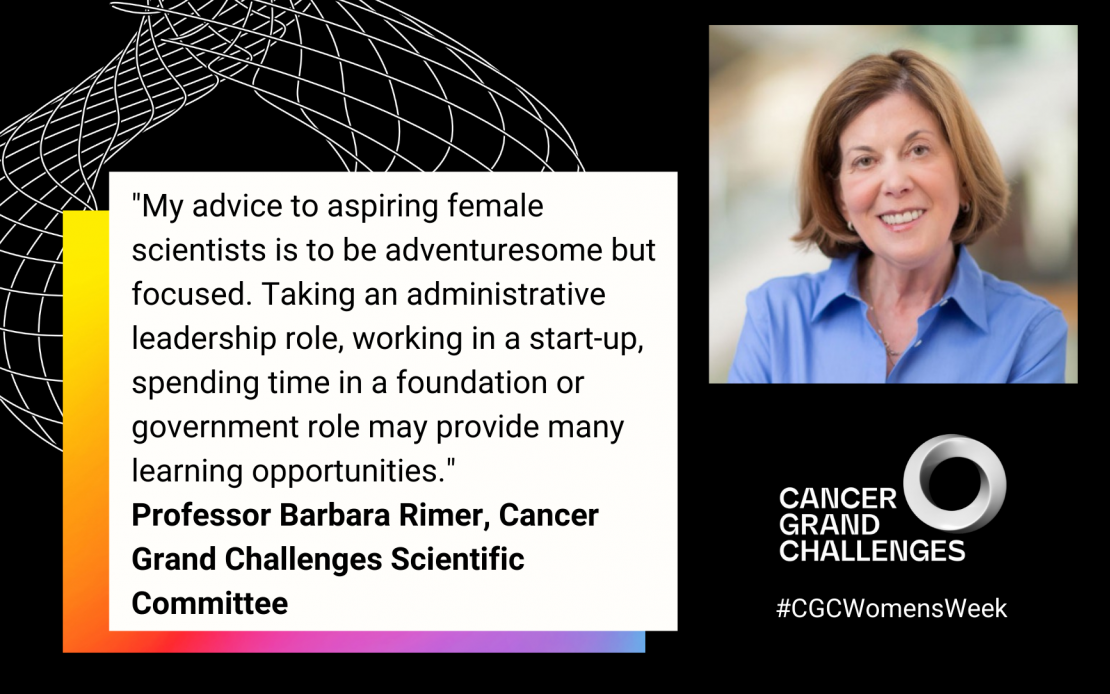Barbara Rimer is our newest member of the Cancer Grand Challenges Scientific Committee. For International Women’s Day 2021 and as part of our Cancer Grand Challenges Women's Week series, we caught up to discuss the importance of learning from each other and aspiring to create an inclusive world.
The slogan of International Women’s Day 2021 is #ChooseToChallenge. What does this mean to you?
Choose – make a conscious decision to speak up, challenge and lead. Challenge the status quo. Don’t assume that because something always has been a certain way, that it should continue to be that way. Be the one who challenges the status quo in a way that is respectful, data-driven and effective. Be a role model for others. Use a variety of tools to communicate the challenge. I use a blog for this purpose sometimes, but there are many vehicles. If we witness an act of inequity, do not let it go unremarked. Do not be an implicit or explicit supporter of bias.
Why should we approach science and research in a global, multidisciplinary and collaborative way?
As the world has changed, cancer and other non-communicable diseases have become more important and more threatening. Sometimes, a particular type of cancers, eg those caused by or associated with HPV infections, may be even more important globally than in high income countries. We can learn a lot from what is happening in other countries. It is a two-way street. What we have learned in the US, England or other high-income countries may be applied elsewhere in the world, but we also can learn from other countries. COVID certainly is a great example of this. We must view the world as inter-connected.
I prefer the word transdisciplinary to multidisciplinary, and when I led the Division of Cancer Control and Population Sciences at the US National Cancer Institute, we were the first to create transdisciplinary research centers. This is not just semantics. Sociologists refer to levels of collaboration, and multidisciplinary is the lowest rung – basically, say, scientists sitting at the same table, but not integrating each other’s theories or ways of thinking. Transdisciplinary means the opportunity for new theories, methods, and ways of working because of the opportunity for integration.
Which female scientists inspire you and why?
When I finished graduate school, my first position was at Fox Chase Cancer Center in Philadelphia, PA. Shirley Tilghman, a basic scientist, who went on to become president of Princeton, was there. We had informal conversations about science and how she did her science. At an early stage in my career, those conversations were very influential. I’ve always found her a person of vision and integrity. I am moved especially by women who have overcome adversity. When I met Shirley, she was overcoming personal challenges and trying to make her way in the competitive world of molecular biology.
I also admire Jenny Ting, an immunologist at The University of North Carolina’s Lineberger Comprehensive Cancer Center. She is fearless and unafraid to take on new areas and topics. Jenny really sets an amazing example of resilience in the face of tragedy, responding with perseverance and innovation. Her daughter worked in our office one summer and went on to work in public health.
What is your advice for aspiring female scientists?
Be adventuresome but focused. Do not be afraid to take reasonable risks, try new things and do not feel compelled to walk on the paths well-worn by others. Do not expect your career to move in a straight line. Taking an administrative leadership role, working in a start-up, spending time in a foundation or government role may provide many learning opportunities. Do not feel compelled to spend your entire life in academia. We need to discover and apply lessons and ideas from multiple fields.
Find good mentors. Be a good mentor. Recognize that you may not be able to have it all. Some women appear to have it all, but often, behind the scenes, they have made their own choices and compromises. Decide what is really important to you and what, at the end of life, you want to have accomplished. I do not necessarily mean the exact contribution but more the type of contribution.
Nurture love. Read widely. Get to know people in other fields. Speak out against injustice and inequities. Get a dog.
Barbara is a member of the Cancer Grand Challenges Scientific Committee. Find out more here.
